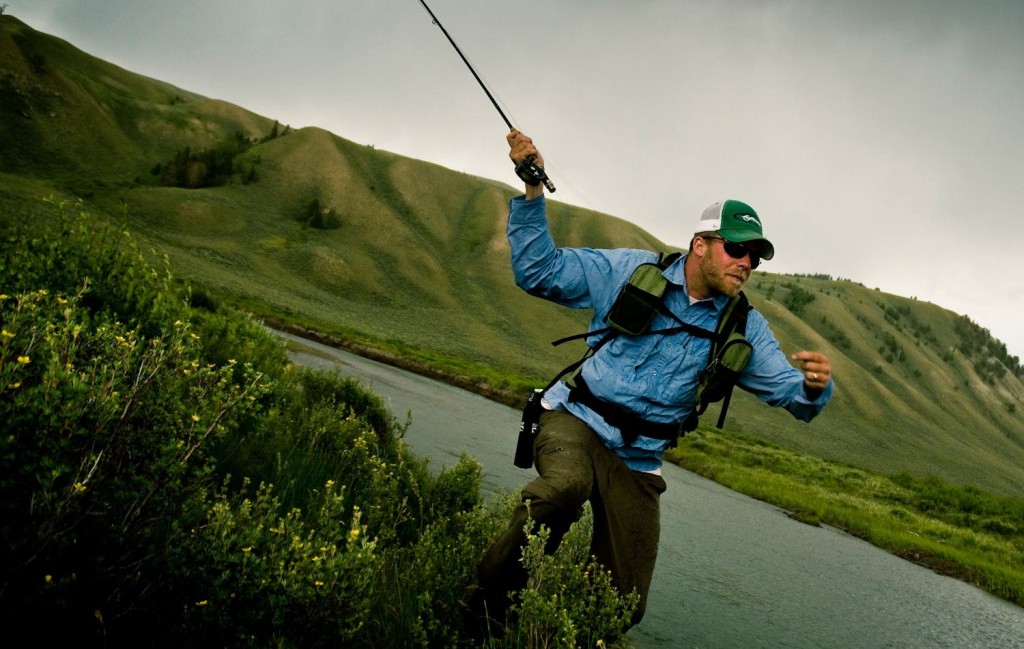Are you finding that you’re lacking distance and falling short of your target with your fly casting?
Is your power and line speed insufficient? If the answer is yes, I bet you’re also getting a fair amount of tailing loops or dreaded wind knots aren’t you? Come on, be honest. There’s absolutely nothing to be ashamed of if you’re periodically falling into this category with your fly casting. Believe me when I say, you’re not at all alone. I see it regularly on the water guiding, and most of the time anglers struggling with these problems usually are only doing one thing wrong with their fly casting. Nine times out of ten, in this scenario, anglers are decelerating their fly rod during their forward cast, back cast, or even both, in some cases. What you need to be doing to fix this problem is smoothly accelerating your fly rod during your casting stroke, making sure you’re stopping the rod at it’s fastest point. This will allow your fly rod to distribute the energy loaded during your cast efficiently, and you’ll have plenty of power (line speed) to reach your targets.
Deceleration During Your Casting Stroke: Short Story & Case Study
This past fall I was fishing big attractor dry flies with a client of mine. There were plenty of big fish willing to rise to our offerings, but to get them to eat, we had to stay far back and make long casts to them. Otherwise they’d spot us and spook. My client, a capable fly fisherman with strengths in short presentations and roll casts, developed a weakness for distance, when a head wind picked up. No matter how hard he tried, he couldn’t get the distance needed to present his dry fly ahead of the fish. Several minutes we worked a prime piece of water that I knew had some eager fish looking up, but we got no takes. My client turned to me and said, “They must not like this fly pattern”. I replied, “You may be right man”, and I handed him the nymph rig and pointed upstream to our next fishing spot. But what I really wanting to say is, “No, the fly pattern is good, you’re just not getting the fly anywhere close to your target”.
There are times when the best thing you can do guiding is to go along with your clients and not voice the complete truth. Now it’s important to understand that I had already explained to him a couple different times, that the problem he was having is that he was slowing down his fly rod to a stop during his casting stroke, and it was sucking his power and distance out of his cast. If I would have pointed out that he failed to get bites because of his inability to correct his deceleration problem during his casting stroke, it would have killed his morale and confidence. And that could have started a falling domino effect, resulting in his fishing skills going down the tubes the remainder of the day. Instead, I decided to cut our losses, and move him up river to another hole where I could position him close enough to make a good presentation, and he quickly hooked up.
The moral of the story is, know your clients limits. Sometimes you have to be willing to walk away from a prime opportunity if your angler can’t execute. Remember, some success is better than no success. Do your best to diagnose and fix casting mechanic errors, but understand you only have so much time on the water, and some battles can’t be won during a single day on the water.
Keep it Reel
Come fish with us in the Bahamas!
Kent Klewein Gink & Gasoline www.ginkandgasoline.com hookups@ginkandgasoline.com Sign Up For Our Weekly Newsletter!

Excellent tip and story! I agree.
As usual, you have it right Kent. The balance between giving instruction and frustrating the day is a delicate one. Some of it depends on the client/learner’s expectations for the trip. If the purpose is to learn to cast, it might be better to start off the water and advance there only when the stroke is sufficient for further learning. For most folks paying for a guided trip, I expect they want to have fun and not feel frustrated and not be corrected the whole trip. The best guides I ever had worked subtly on my technique, allowing me to enjoy the fishing and learn what I can. I think you have said it in prior posts: expectations should be worked out at the start of the trip, not halfway into it.
By the way, I think casting is over-rated as a skill in river fishing. Line management and positioning will do more for catching trout on a river than casting will ever do.
Different strokes, for different folks!
Casting is a skill that can never be over-rated, whether it is in a river, lake or the sea. Line management starts with casting, it is a key element.
If two anglers have positioned themselves correctly, and all other factors are equal; fly selection, reading of the river, then I know which one my money would be on to “raise the fish”. The one with the better casting ability! As this article testifies.
Touche, Rob.
Actually I agree with you; all other things being equal, a person with better casting ability has the edge on raising the fish. In my decades of fly fishing, I learned and improved my casting and still try to improve more. However, all things are rarely equal. I spent two hours yesterday on a local river and caught a couple dozen winter fish, never casting more than 40 feet. I can and do cast longer distances on the river, and I have successfully fished for reds, snook, bonefish, and tarpon in salt and I do not discount casting distance, accuracy and technique as being the key to success there. All I am saying is that a newbie on the river needs to enjoy the day as well as getting tips on casting. One way to ensure that is to help them get in the right place, cast far enough to get a good drift, and manage the line well (in the cast and by mending).
Indeed Ralph. I’m not a guide, so I suppose part of the guide’s secret to success is to gauge quickly what is front of them and adapt accordingly. I’ve taught many people to cast and no matter what their level of ability is I truly believe encouragement is the key to their personal development as better casters and flyfisherman. I’m currently teaching a 9 year old Mexican boy to flyfish in a country whose local population knew little of the etiquette and methods of flyfishing. Watching this young boy catch trout on fly is tremendously rewarding. It’s fascinating watching the uptake of flyfishing here in Mexico.
Also, successful flycasting is not only about distance, sometimes the most difficult casts are executed under very short distances under difficult environments.
“Also, successful flycasting is not only about distance, sometimes the most difficult casts are executed under very short distances under difficult environments.”
Well said Rob 🙂
Kent
Rob, I do not disagree with you. We are on the same page. I teach Fly Fishing Merit Badge, Fly Fishing for Vets, my grandkids, and anyone who wants to learn. I am just advocating balance and fun into the equation. It ain’t rocket science. It’s fishing. All I’m sayin’.
Ralph,
You spend a great deal of time on the water my friend. It makes me feel good when anglers such as yourself find my words genuine and helpful for growing fly fisherman. Thanks for the comment.
Kent
‘Smooth acceleration with two sudden stops’ is the basis of fly-casting right? I’m self-taught living in a place with very few people who fly-fish, and many of which may find my affinity for this style of fishing ‘odd’.
Muddymudskipper,
Whereabouts are you talking about fishing and living? You sparked my curiosity.
Kent
The middle of Mississippi!
“There are times when the best thing you can do guiding is to go along with your clients and not voice the complete truth. ”
That, my friend, is pure gold…. Very good piece, Bud! Some great advice here!
Joe,
I appreciate you giving me the thumbs up on today’s fly fishing tip. I means a lot coming from another guide.
Kent
I find that quote to be true in almost all facets of life. Clients, girlfriends, wives, bosses etc. Great piece of advice 🙂
You hit the nail on the head with this one Kent. Sometimes when I’m really focused on something else I’ll decelerate during my forward stroke, killing my presentation. This happens to me more often when I’m sight fishing, and I’m focusing on the fish I’m casting to, and thinking to myself “don’t screw this up”. I have to settle down, stop thinking so much, and get back to basics.
Pingback: February 28, 2014: TGIF Link Round-Up | Feather and Fin
Pingback: Fly Casting Tip: Don't Ride the Brake | MidCurrent